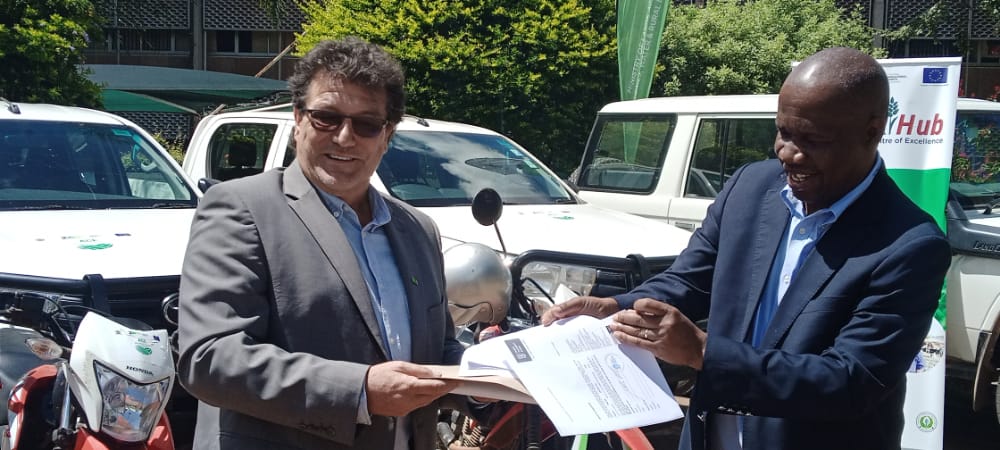|
Getting your Trinity Audio player ready...
|
A handover of vehicles to the Ministry of Lands, Agriculture, Fisheries, Water, and Rural Development by the European Union (EU) under the Zimbabwe Agricultural Knowledge and Innovation Services (ZAKIS) project will bridge mobility gaps in the sector.
In his speech, read today by Chief Director for Irrigation for the Ministry of Lands, Agriculture, Fisheries, Water and Rural Development, Eng Tinayeishe Mutazu on his behalf, Dr. John Basera, the Permanent Secretary, said ZAKIS has been pivotal to add new perspectives and stock of knowledge on various agricultural themes.
“I’m informed that the capacitation has gone a notch higher wherein today we are officially transferring the ownership of 8 vehicles and 18 motorcycles to the Ministry. This great partnership gesture will go a long way in strengthening the integration of agricultural research, education, and extension which the ZAKIS project has been promoting since its inception in 2018.
“Ladies and Gentlemen, it is heartening to note the following ZAKIS activities that are contributing to Government’s agriculture transformation strategy with respect to:
- Building institutional capacity in research, education, and extension, with a commercial orientation, working with the private sector, retaining skills and establishing knowledge and capacity.
- Developing a responsive pluralistic extension system informed by farmers, markets and research.
- Developing prioritized research, technologies and global learning to inform education and extension.
- Developing dynamic agricultural education curriculum informed by farmers, markets and research.
“The ZAKIS’ objective to transform Zimbabwe’s agricultural research, education and extension services for the future is centred on developing Agricultural Centres of Excellence (ACEs) which bring together research, education and extension. To date, ZAKIS has established two physical ACEs at the Chibero Agricultural College and Matopos Agricultural Research Institute. Each ACE is linked to two neighbouring District Agricultural Centres of Excellence (DACE) with Chibero linked to Mhondoro-Ngezi and Chegutu and Matopos Research Institute linked to Insiza and Matobo,” Dr Basera said.
He said the established centres of excellence stimulate and sustain agriculture transformation in Zimbabwe through the development of costed business plans which sought to demonstrate potential income streams for revenue in support of core institutional sustainability.
Further, the business plans of ACEs and DACEs will incorporate income-generating projects. Demonstration of technologies that are viable and their implementation in the linked districts will enable trained farmers to change their livelihoods for the better. Roping-in of the private sector, a deliberate priority by ZAGP-ZAKIS between the ACEs and private sector players would enable the former to generate better income and commercialization of particular products by ACEs.
Matthias Spaeth, Country Director of Welt Hunger Hilfe (WHH) in Zimbabwe, speaking on the same occasion, said the main objective of the ZAKIS project is to contribute to improved agricultural productivity by implementing an integrated research, education and extension framework that is farmer-centric.






